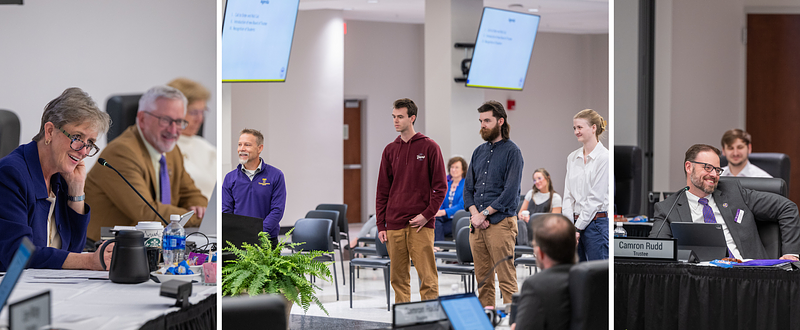Rudd is a 2021 recipient of Tech’s “Outstanding Young Alumnus” award
The board of trustees at Tennessee Tech University welcomed its newest member and paved the way for an expected fall 2024 start of the university’s nuclear engineering degree program at its quarterly meeting March 7.
Trustees also heard a report on the university’s latest state audit, which showed no findings, voted to act on the results of a third-party compensation study and learned of preliminary plans for a new Master of Science in child life within the university’s School of Human Ecology, among other developments.
Camron Rudd, a 2005 Tech graduate with degrees in both mechanical engineering and foreign languages with a concentration in German, was appointed by Gov. Bill Lee to complete the term of former trustee Teresa Vanhooser, who announced her resignation from the board in Dec. 2022.
Rudd was confirmed unanimously last month by the Tennessee General Assembly and is a 2021 recipient of Tech’s “Outstanding Young Alumnus” award. He serves as chief operating officer for Hörmann North America, a family-owned entry systems manufacturer headquartered in nearby Sparta, Tennessee.
“I’m ecstatic to be here,” said Rudd in remarks at the board’s morning executive committee meeting. “I really appreciate the opportunity that was afforded to me by the Governor. I hope we can do some great things for Tennessee Tech and I’m looking forward to it.”
In the full board’s afternoon meeting, trustees gave their unanimous approval for the university’s proposed Bachelor of Science in nuclear engineering, setting up a likely fall 2024 start date. The proposal now goes back to the Tennessee Higher Education Commission (THEC), which already provided preliminary support earlier this year, for final approval.
“The proposed program in nuclear engineering aims to meet the current demand for nuclear engineers trained at the baccalaureate level, as well as to address emerging needs as Tennessee grows a nuclear development and manufacturing ecosystem,” said Tech Provost Lori Mann Bruce in comments to the board’s Academic and Student Affairs Committee.
The 128-credit hour program will be only the second nuclear engineering degree currently offered in Tennessee. The university expects to enroll nearly 50 nuclear engineering majors by the program’s fifth year, which, according to Provost Bruce, would increase the number of nuclear engineering graduates in the state by 25 to 30%.
Provost Bruce also shared with trustees the university’s pre-proposal for a Master of Science degree in child life within the university’s School of Human Ecology. If approved by THEC and by the board at a later date, the online degree program could begin enrollment in the fall of 2025.
“The purpose of the program is to prepare professionals to serve in child life roles in health care,” said Provost Bruce. “It will provide advanced content knowledge and child life clinical practice, psychosocial care of children and families and evidence-based practice to meet the needs of credentialed child life specialists.”
In the board’s Audit and Business Committee meeting, Claire Stinson, vice president for planning and finance, updated trustees on the university’s fiscal year 2023 audit from the Tennessee Comptroller of the Treasury.
“We had an unmodified opinion, and we had no findings,” explained Stinson, garnering a round of applause from trustees.
Stinson and Kevin Vedder, associate vice president for human resources, also introduced guests from Mercer, a consulting firm specializing in human resources retained by the university to study faculty and staff compensation and propose ways to improve market competitiveness.
Based on the findings of the Mercer study, the university presented a multi-year plan to trustees that included allocating $1.76 million for salary increases, including bringing all permanent university employees to a minimum salary of $15 per hour. As a second step, the plan would allocate $2.28 million for recurring salary increases, pending passage of the state’s 2024 – 2025 budget. Trustees approved the plan unanimously.
“We compete on a daily basis to keep the best here at Tennessee Tech,” explained Tech President Phil Oldham in remarks to trustees. “We want to make sure our compensation plans and infrastructure is up to the very top level so that we can compete successfully.”
Photo courtesy of Tech.
Other stories you may want to check out:








